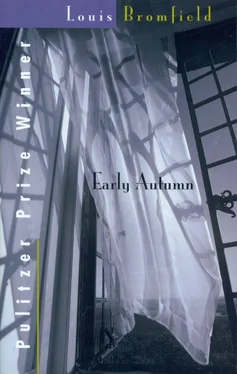This time he did not wait or ride slowly toward her. He galloped impatiently as a boy across the wet fields to meet her.
She had the old look of radiance about her and a shyness, too, that made her seem at first a trifle cool and withdrawn. She told him quietly, “Sybil didn’t come this morning. She went out very early to fish with Jean de Cyon. The mackerel are beginning to run in the open water off the marshes.”
There was an odd, strained silence and O’Hara said, “He’s a nice boy … de Cyon.” And then, with a heroic effort to overcome the shyness which she always managed to impose upon him, he said in a low voice, “But I’m glad she didn’t come. I’ve wanted it to be like this all along.”
She did not say archly that he must not talk in this vein. It was a part of her fascination that she was too honest and intelligent not to dispense with such coquetry. He had had enough of coquetry from cheap women and had wearied of it long ago. Besides, she had wanted it “like this” herself and she knew that with O’Hara it was silly to pretend, because sooner or later he always found her out. They were not children, either of them. They both knew what they were doing, that it was a dangerous, even a reckless thing; and yet the very sense of excitement made the adventure as irresistible to the one as to the other.
For a little time they rode in silence, watching the dark hoofs of the horses as they sent up little showers of glittering dew from the knee-deep grass and clover, and presently as they turned out of the fields into the path that led into the birch woods, he laughed and said, “A penny for your thoughts.”
Smiling, she replied, “I wouldn’t sell them for millions.”
“They must be very precious.”
“Perhaps … precious to me, and to no one else.”
“Not to anyone at all. …”
“No. … I don’t think they’d interest anyone. They’re not too cheerful.”
At this he fell silent again, with an air of brooding and disappointment. For a time she watched him, and presently she said, “You mustn’t sulk on a morning like this.”
“I’m not sulking. … I was only … thinking.”
She laughed. “A penny for your thoughts.”
He did not laugh. He spoke with a sudden intensity. “They, too, are worth a million … more than that … only I’ll share them with you. I wouldn’t share them with anyone else.”
At the sound of his voice, a silly wave of happiness swept through Olivia. She thought, “I’m being young and ridiculous and enjoying myself.”
Aloud she said, “I haven’t a penny, but if you’ll trust me until tomorrow?”
And then he turned to her abruptly, the shyness gone and in its place an emotion close to irritation and anger. “Why buy them?” he asked. “You know well enough what they are. You haven’t forgotten what I told you on the terrace at Brook Cottage. … It’s grown more true every day … all of it.” When he saw that she had become suddenly grave, he said, “And what about you?”
“You know how impossible it is.”
“Nothing is impossible … nothing. Besides, I don’t mean the difficulties. Those will come later. … I only mean your own feelings.”
“Can’t you see that I like you? … I must like you else I wouldn’t have come alone this morning.”
“Like me,” he echoed with bitterness. “I’m not interested in having you like me!” And when she made no reply, he added, almost savagely, “Why do you keep me away from you? Why do you always put a little wall about yourself?”
“Do I?” she asked, stupidly, and with a sense of pain.
“You are cool and remote even when you laugh.”
“I don’t want to be—I hate cold people.”
For a moment she caught a quick flash of the sudden bad temper which sometimes betrayed him. “It’s because you’re so damned ladylike. Sometimes I wish you were a servant or a scrub-woman.”
“And then I wouldn’t be the same—would I?”
He looked up quickly, as if to make a sudden retort, and then, checking himself, rode on in silence. Stealing a glance at him, Olivia caught against the wall of green a swift image of the dark, stubborn tanned head—almost, she thought, like the head of a handsome bull—bent a little, thoughtfully, almost sadly; and again a faint, weak feeling attacked her—the same sensation that had overcome her on the night of her son’s death when she sat regarding the back of Anson’s head and not seeing it at all. She thought, “Why is it that this man—a stranger—seems nearer to me than Anson has ever been? Why is it that I talk to him in a way I never talked to Anson?” And a curious feeling of pity seized her at the sight of the dark head. In a quick flash of understanding she saw him as a little boy searching awkwardly for something which he did not understand; she wanted to stroke the thick, dark hair in a comforting fashion.
He was talking again. “You know nothing about me,” he was saying. “And sometimes I think you ought to know it all.” Looking at her quickly, he asked, “Could you bear to hear it … a little of it?”
She smiled at him, certain that in some mysterious, clairvoyant fashion she had penetrated the very heart of his mood, and she thought, “How sentimental I’m being … how sickeningly sentimental!” Yet it was a rich, luxuriant mood in which her whole being relaxed and bathed itself. She thought again, “Why should I not enjoy this? I’ve been cautious all my life.”
And seeing her smile, he began to talk, telling her, as they rode toward the rising sun, the story of his humble origin and of those early bitter days along India Wharf, and from time to time she said, “I understand. My own childhood wasn’t happy,” or, “Go on, please. It fascinates me … more than you can imagine.”
So he went on, telling her the story of the long scar on his temple, telling her as he had known he would, of his climb to success, confessing everything, even the things of which he had come to be a little ashamed, and betraying from time to time the bitterness which afflicts those who have made their own way against great odds. The shrewd, complex man became as naive as a little boy, and she understood, as he had known she would. It was miraculous how right he had been about her.
Lost in this mood, they rode on and on as the day rose and grew warm, enveloped all the while in the odor of the dark, rich, growing thicket and the acrid smell of the tall marsh ferns, until Olivia, glancing at her watch, said, “It is very late. I shall have missed the family breakfast.” She meant really that Anson would have gone up to Boston by now and that she was glad—only it was impossible to say a thing like that.
At the gravel pit, she bade him good-bye, and turning her mare toward Pentlands she felt the curious effect of his nearness slipping away from her with each new step; it was as if the hot August morning were turning cold. And when she came in sight of the big red brick house sitting so solidly among the ancient elms, she thought, “I must never do this again. I have been foolish.” And again, ‘Why should I not do it? Why should I not be happy? They have no right to any claim upon me.”
But there was one claim, she knew; there was Sybil. She must not make a fool of herself for the sake of Sybil. She must do nothing to interfere with what had been taking place this very morning in the small fishing boat far out beyond the marshes somewhere near the spot where Savina Pentland had been drowned. She knew well enough why Sybil had chosen to go fishing instead of riding; it was so easy to look at the girl and at young de Cyon and know what was happening there. She herself had no right to stand in the way of this other thing which was so much younger and fresher, so much more nearly perfect.
Читать дальше












